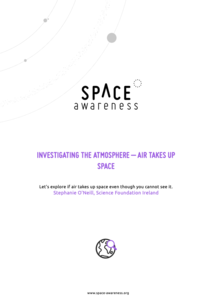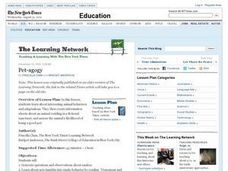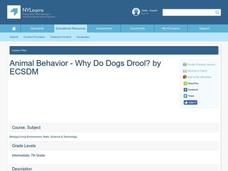Howard Hughes Medical Institute
Niche Partitioning and DNA Metabarcoding
What is DNA metabarcoding? Show your biology class the latest method for studying biodiversity in an ecosystem with a fun, informative interactive. Individuals examine the animal species that compete for vegetation, then learn how their...
Agriculture in the Classroom
Build it Better
If you think you can do better, feel free to give it a try. Pupils learn about the work on Temple Grandin and consider ways to improve animal handling facilities. They work in groups to build models to showcase their ideas.
Space Awareness
Investigating the Atmosphere - Air Takes Up Space
How do you know there is air? Can you see it, smell it, feel it? To begin the investigation, learners watch a video and discuss what they know about air and the atmosphere. Then, they participate in five different hands-on, inquiry-based...
Curated OER
Growing Penguins
A collection of photos and accompanying descriptions describing the life cycle of an Adelie penguin is the highlight of this resource. Working in groups, polar explorers match the descriptions to the pictures and create a timeline. An...
Curated OER
Hidden Animals
Students predict the safest seashore substrate for animals. For this animal habitat experiment, students predict, test their hypothesis, and record data about how wave shocks affect animals living on either sand, gravel or rock.
Curated OER
Elevation, Plants and Animals
Students determine whether elevation is one of the things that affect where and how plants and animals live. They read plant and animal physical descriptions and determine the environment where the animal might live.
Curated OER
Learning in Cockroaches
Learners make scientific observations. In this stimulus response lesson, students make observations and collect data to determine if cockroaches can learn. A secondary purpose of this lesson is to provide learners with the opportunity to...
Curated OER
Animals, Soil, Trees
Fourth graders describe the various kinds of soils and how plants and animals are affected by them. They describe the baic needs of plants, scoring at least a 3 or 4 on a 4-point rubic. Students are able to predict and/or infer what...
K12 Reader
Adapting to Survive
Life science and language arts come together in a passage about animal adaptation. After kids learn about how organisms adapt to conditions in their environments, they complete five reading comprehension questions based on context clues...
New York State Department of Environmental Conservation
Adaptations – Designs for Survival
What's the difference between behavioral adaptations and physical adaptations? Learn about the various ways that organisms adapt to their environment with a worksheet about the creatures of the Hudson River.
American Museum of Natural History
Ask a Scientist About Dinosaurs
Who doesn't want to know more about the mysterious dinosaurs? Learners read about dinosaurs and the process scientists use to continue learning more about the animals in an interview-type format. A paleontologist responds to submitted...
American Museum of Natural History
They Glow!
Would you believe marine animals can make their own light? An online resource describes the process of bioluminescence and how animals in the ocean use it to survive. The lesson features a catchy tune that describes the behavior of ocean...
Prince William Network
The Incredible Journey
Divide your school gym into breeding grounds and non-breeding grounds so that your zoologists can play a game simulating the seasonal migration of shorebirds. Players pick one of the included game cards and follow its directions, which...
EngageNY
Grade 9 ELA Module 3, Unit 1, Lesson 8
Have you ever wanted to learn more about a subject after you finished a great book? Guide ninth graders through an inquiry-based research project as they finish the first chapter of Temple Grandin's Animals in Translation. Having...
Curated OER
Disney's Animal World Part 2: That's My Baby
Students see that baby animals go through different stages of growth during their life, just as people do. They use the downloadable Cyberinstructional activity Worksheet to reinforce what they have learned about animals and their...
Curated OER
Wildlife Conservation I
Focusing on the wildlife in their area, learners identify endangered and threatened species and what these animals need to survive. While this activity involves animals in the Long Island area, it could be adapted for use with any area.
Curated OER
What's All the Buzz About
Students participate in a game of charades to examine different animal behaviors. After reading an article, they discuss why bees waggle and how that behavior applies to humans. They research the behaviors of an animal of interest to...
Curated OER
Pet-agogy
Students explore interesting animal behaviors and adaptations. They create information sheets about an animal residing in a fictional sanctuary and assess the animal's likelihood of being a good pet.
Curated OER
Cold and Warm Blooded Animals
Students research facts about a cold or warm-blooded animal in order to designa report either as PowerPoint or word processed document. They use online resources and insert images in to the report. They include the specified criteria and...
Curated OER
What Do We Learn From Fossils?
Students investigate what a fossil is and how it came to be. In this fossil lesson, students examine pictures of skeletons and identify characteristics that can and cannot be determined by a fossil. Students complete diagrams of a...
Curated OER
Learning to Communicate with Dogs: The Importance of Training
Students learn the importance of communication especially when it comes to animals. Students are shown video clips of a dog displaying unwanted behavior. Students participate in a class brainstorm where they list ideas of how people...
Curated OER
Animals of the Fire Ice
Students study ice worms and describe how they interact with other species. In this methane hydrate lesson plan students study ice worms and hydrate shrimp to learn their behavior and can participate in an optional activity.
Curated OER
Drama: Learn A Lesson from the Lion
Reading is reading, whether it's for drama or English class. Boost reading fluency, accuracy, intonation, and comprehension while fostering creative acting skills. Kids read the provided tale of "The Lion and the Mouse" several times in...
Curated OER
Animal Behavior - Why Do Dogs Drool?
Seventh graders give examples of learned behaviors. In this life science lesson, 7th graders simulate a behavior conditioning experiment. They complete an assessment at the end of the lesson.

























